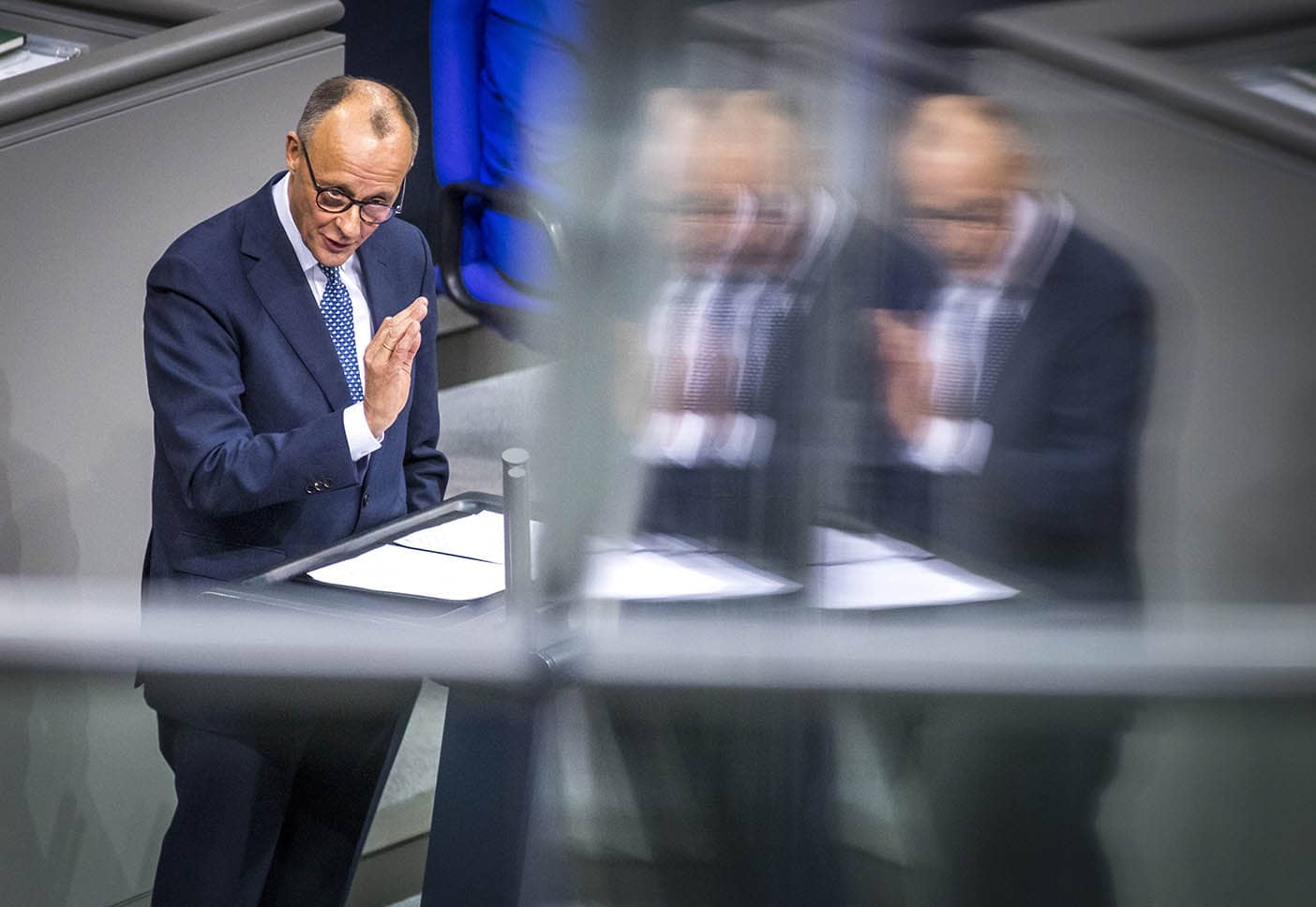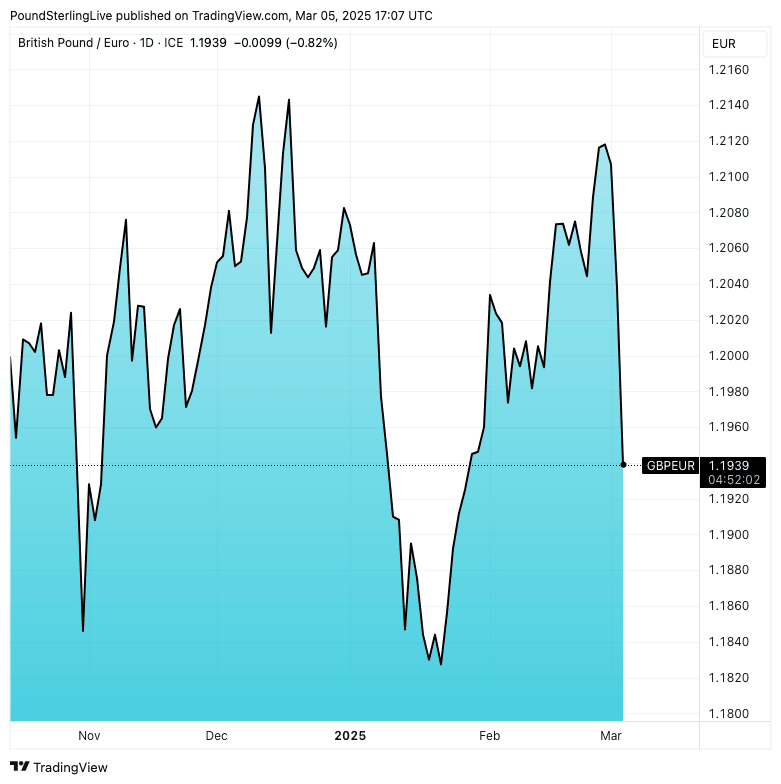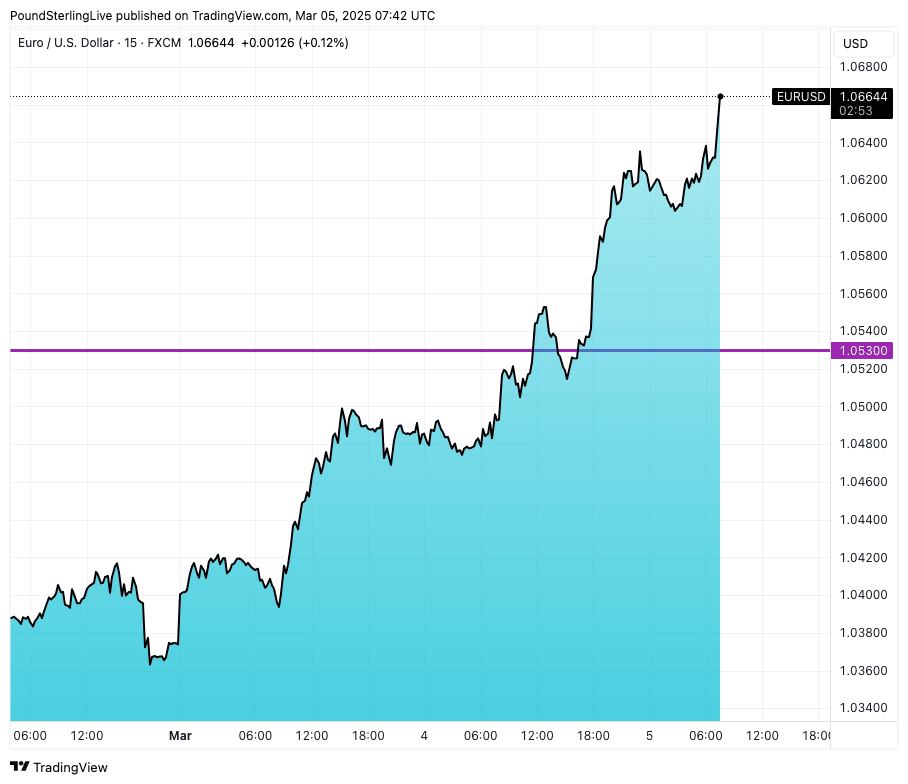
File image of Friedrich Merz, Reichstag building, plenary hall, Berlin / Germany. Photographer: Thomas Köhler / photothek, for bundestag.de.
Pound Sterling has fallen by over a per cent since Germany and the EU signalled a readiness to start spending.
The Pound-to-Euro exchange rate has fallen 1.26% since incoming Chancellor Friedrich Merz delivered a "whaterver it takes" moment, announcing a significant commitment to borrow more money to invest in defence and infrastructure.
The exchange rate has fallen to 1.1943 at the time of writing, having been as high as 1.2131 late last week, and Wednesday's loss of 0.80% looks set to be the biggest daily decline since October 2024.
"The announced German fiscal package is a watershed moment for EUR," says Athanasios Vamvakidis, FX Strategist at Bank of America, as he announces a number of 'long' Euro trades to take advantage of further strength.
"In view of the threats to our freedom and peace on our continent," Merz said Tuesday evening in Berlin, the motto "whatever it takes" must now apply to the country's defense.
Merz, whose CDU/CSU will lead the next government that will include the SPD, said coalition talks had yielded an agreement to launch a €500BN infrastructure fund to invest in priorities such as transportation, energy grids and housing.
However, the changes must be made quickly and be concluded in the current parliament as the current coalition - which includes the Greens - can deliver the three-quarters majority needed to enact constitutional change.
This won't be likely when the new government forms, owing to surges for far-left and far-right parties in the just-held elections that have whittled down the size of Germany's political centre.
Economists say Germany has long been constrained by the Schuldenbremse, or debt brake, which caps the federal government's new borrowing at 0.35 percent of Germany's gross domestic product.
By spending more, Germany is set to inject a strong growth pulse into the Eurozone economy, which is reflected in a strengthening Euro.
Mathieu Savary, Chief European Strategist at BCA Research, says, "Europe is escaping its liquidity trap, its animal spirits are coming out of hibernation, and European investors are increasingly willing to buy European risky assets."
"Fiscal austerity is out of favour. Austerity had unnecessarily burdened Europe and exacerbated the private sector’s deleveraging... a challenging global environment is jolting European officials into action," he explains.
Above: GBPEUR at 15-minute intervals showing the selloff on news of European fiscal expansion.
The German response follows a decision by the U.S. to stop supporting Ukraine while at the same time moving to strengthen Russia by reversing sanctions.
"The political developments in Europe and the world are evolving faster than we anticipated just a week ago," Merz said. "Germany and Europe must now undertake extraordinary efforts to ensure our defense capabilities."
Germany's central bank, the Bundesbank, on Tuesday proposed a reform of the debt brake that would lift the cap for annual net borrowing to 1.4% of GDP from 0.35%.
Currency strategists at Morgan Stanley say changes to European fiscal policy could be enough to trigger a fresh leg higher by the Euro.
"Global investors have taken notice of a potential increase in European fiscal spending in the wake of the German election," says David S. Adams, a strategist at Morgan Stanley.
Above: EURUSD at 15-minute intervals. The chart shows a clear break above a long-running resistance area at 1.0530.
Also on Tuesday, European Commission President Ursula Von Der Leyen proposed EUR150BN of new loans for Pan-European defence spending.
The European Commission is also ready to activate the special budgetary escape clause allowing member states to spend more on their national budgets without breaking strict EU fiscal rules.
This means that member states will not be triggering excessive deficit procedures to increase defence-linked spending.
It is estimated that this will allow the EU to spend an additional EUR650BN on defence over the next four years without triggering any budgetary penalties.
"We are in an era of rearmament," said Von Der Leyen. "Europe is ready to massively boost its defense spending."
The plans will not require unanimous approval by the member countries, which means Hungary or other problematic nations cannot veto it in the bloc


